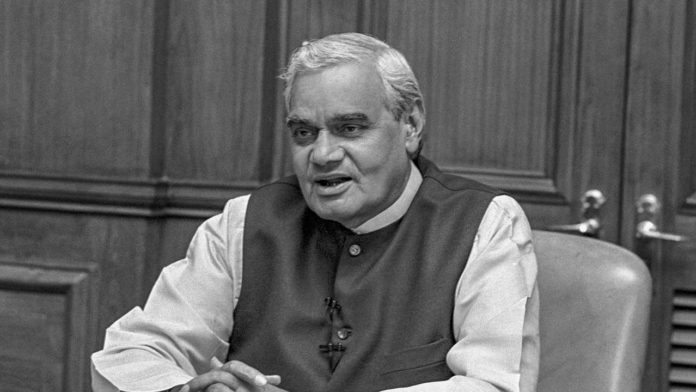NEW DELHI, Aug. 17 (BSS/Xinhua) — Former Indian Prime minister Atal
Bihari Vajpayee, who passed away Thursday evening, will be cremated on Friday
with full state honors.
He will be cremated at “Rashtriya Smriti Sthal,” a space allocated to
cremate tall Indian leaders, including premiers and former premiers.
A nationwide seven-day mourning is being observed as a mark of respect to
the departed soul. All offices of the central government across the country
will be closed on Friday afternoon.
The national flag will fly at half-mast throughout the country and Indian
missions abroad, said a statement issued by the Indian government.
The spot where Vajpayee will be cremated is located between “Vijay Ghat”
and “Shanti Van,” the memorials of former premiers Lal Bahadur Shastri and
Jawaharlal Nehru, respectively.
Thousands of people have been paying their last respects to the departed
leader at his official residence “6A Krishna Menon Marg” in Delhi since
Friday morning.
His mortal remains will be shifted to the head office of Bharatiya Janata
Party (BJP), to which Vajpayee belonged, at “6 Pandit Deen Dayal Upadhyay
Marg” near central Delhi, where elaborate arrangements have been made to let
people pay their homage.
As a mark of respect to the departed leader, all schools, educational
institutions and offices of Delhi state government have been shut. Similarly,
many other states have announced a mourning holiday.
As many as 25 main roads have been shut for vehicular traffic, to ensure
a smooth last journey of Vajpayee, first from his residence to the party
office and then to the cremation site.
The funeral procession will begin from the BJP headquarters at around 1
p.m. local time and end at “Rashtriya Smriti Sthal” where the last rites are
scheduled to begin at 4 p.m. local time.
Vajpayee served as the Indian prime minister thrice – first in 1996 for
only 13 days, and then for two consecutive terms between March 1998 to May
2004, out of which the first tenure lasted for 13 months followed by another
term of full five years.
During his active political life, he was always seen as a great orator
and had friends cutting across party lines.
Besides his political life, Vajpayee also served as a journalist after
completing his education. He also served as India’s external affairs minister
from March 1977 to July 1979.
Vajpayee became a member of India’s parliament for the first time in
1957. Thereafter, he was elected to the parliament many times, to both houses
of Indian parliament – Lok Sabha and Rajya Sabha.
He had the distinction of being the only parliamentarian in the country
to have been elected from four different states – northern state Uttar
Pradesh, western state Gujarat, central state Madhya Pradesh and Delhi.
Vajpayee visited China in 2003 as India’s prime minister.



